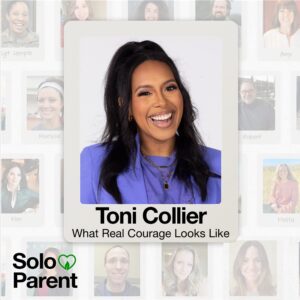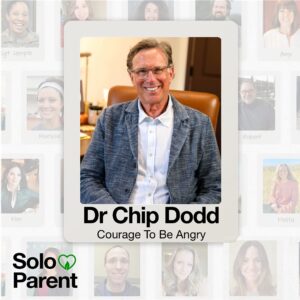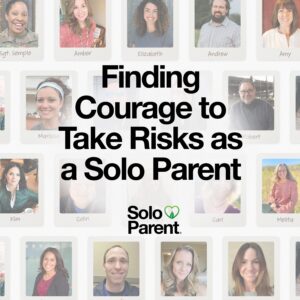Guest: Adam Young, Therapist and Author of Make Sense of Your Story
If you’ve ever second-guessed yourself so much that you stopped listening to your own instincts, you’re not alone. For many solo parents, the idea of “trusting your gut” feels foreign, even unsafe. Maybe you were told that your heart was deceitful. Maybe your childhood trained you to believe your voice didn’t matter. Or maybe you’ve been so overwhelmed by the demands of parenting alone that it feels easier to just follow someone else’s lead.
But when we cut off from our internal voice, we also cut off from clarity, peace, and a deeper relationship with ourselves, and even with God.
In this week’s episode, therapist and author Adam Young helps us explore why it’s so hard to trust our own intuition and how we begin to rebuild that trust. For solo parents, this conversation hits close to the heart. Because learning to rely on your inner wisdom again isn’t just about healing the past, it’s about regaining confidence, direction, and wholeness in the present.
Key Insights From This Episode
- When you’ve experienced trauma, clarity can feel safer than curiosity. But healing begins when you stop outsourcing your decisions and start listening inward.
- Just because something feels uncomfortable doesn’t mean it’s wrong. Sometimes, discomfort is what growth feels like.
- You cannot change what you’re not aware of. Rebuilding self-trust starts with noticing what your body is trying to tell you.
When you’ve experienced trauma, clarity can feel safer than curiosity.
Disconnection from your inner voice often starts early. If your big emotions weren’t welcomed growing up, or your needs were minimized, you may have learned that tuning out your body and gut was the safest option. Then as adults, especially in some religious settings, we’re told our hearts can’t be trusted. So we outsource. We look to pastors, books, friends, or parenting experts to tell us what to do while our own bodies and hearts are screaming to be heard.
But ignoring ourselves isn’t sustainable. At some point, we must return home to our own bodies, our own stories, and the wisdom we carry inside. And that work can feel disorienting. As Elizabeth shares in the episode, “I was always questioning myself… it’s only been this year that I’ve started working to reconnect with my body in a way that is meaningful and healing.”
Adam explains that trauma often fragments the brain, and when we’re fragmented, we crave clarity. That’s why so many solo parents are drawn to voices that sound certain—even if those voices drown out our own. “When you’ve experienced trauma,” he says, “certainty makes the brain feel more stable.” That’s not a character flaw. It’s a survival response. But long-term, it’s not where healing lives.
Just because something feels uncomfortable doesn’t mean it’s wrong.
To move forward, we must reclaim our inner authority. That doesn’t mean ignoring wise counsel, it means learning to bring those outside voices into conversation with your own voice. “I’ll gather wisdom,” Elizabeth says, “but I have to know what’s right for me before I move forward.” That shift from external validation to internal discernment is what real healing looks like.
One of the most confusing parts of healing is that it often feels just as uncomfortable as what hurt us. So how do you know the difference between a bad gut feeling and the growing pains of healing?
“You’ll know them by their fruit,” Adam says. True intuition, he explains, shows up over time, in patterns. If you consistently feel unsafe, unheard, or diminished in a relationship, that’s a cue to listen to your gut. But if something feels unfamiliar or hard because it’s healthier than what you’re used to, that discomfort might be an invitation to stay in the ring.
If the result of a choice is more grief, more truth, more freedom…that’s growth. “Sometimes,” Adam says, “discomfort just means you’ve arrived at a new level of honesty.”
You cannot change what you’re not aware of.
Healing your intuition starts with reconnecting to your body. Not your thoughts, not your logic, your body. What are you actually feeling in your chest, your shoulders, your gut? “You can’t bring kindness or curiosity to what you’re not aware of,” Adam says. And you can’t change old neural patterns without that awareness.
One of the simplest and most transformative practices? A two-minute body scan. “Just notice what’s happening inside you. Bring presence to it. That’s where transformation begins.” For Elizabeth, somatic yoga has become a powerful tool, holding certain restorative poses has allowed emotions to rise and move through her body, sometimes with tears, sometimes without explanation.
It’s not about fixing yourself. It’s about being with yourself. “When your body is in different positions,” Adam reflects, “you experience different emotions. That’s huge.”
Listener Question
“I don’t know who I am anymore outside of being a parent. It’s all-consuming, especially doing it all on my own. How can I begin to rediscover my identity?”
This question echoed through the whole episode. Start small. Notice what brings you life. A walk. A quiet cup of coffee. Dancing in the kitchen. The point is: reconnect with yourself outside of your roles. Let curiosity (not pressure) lead the way.
And maybe most importantly, as Robert reminds us, “If you’re not paying attention to your story, it’s really hard to identify your identity.”
Resources Mentioned in This Episode
- Make Sense of Your Story: Why Engaging Your Story With Kindness Changes Everything by Adam Young
- The Place We Find Ourselves hosted by Adam Young: A podcast focused on trauma, healing, attachment, and story work. Specifically mentioned is a two-part series on our relationship with our bodies.
- adamyoungcounseling.com: Find more about Adam’s work, resources, and podcast episodes.
We want to answer any Solo Parent questions you may have. Submit your listener questions HERE.
Additional Resources:




